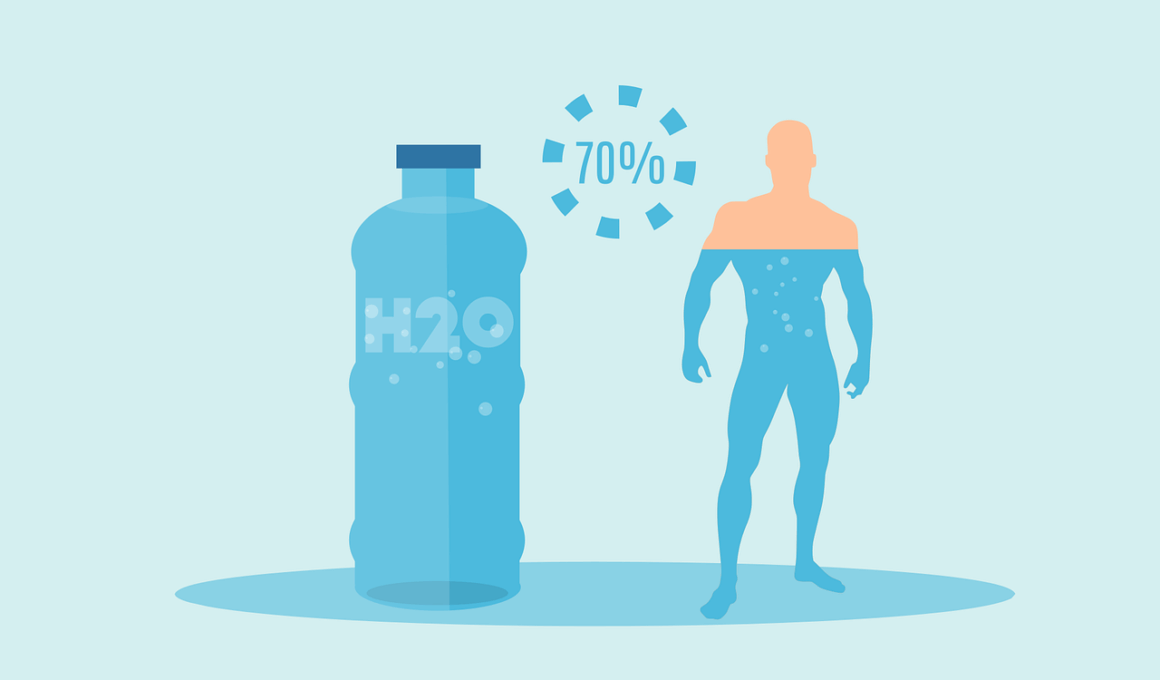Signs of Inadequate Hydration Affecting the Liver
Inadequate hydration can significantly impact liver function, manifesting through various symptoms. The liver is essential for detoxifying harmful substances, and dehydration may impair this process. One common sign is fatigue, which often arises from the liver’s inability to function optimally with insufficient water intake. Dehydration can also lead to concentrated bile production, hindering digestion and nutrient absorption. Consequently, individuals may experience gastrointestinal discomfort or bloating due to poor digestive function. Additionally, dehydration can affect the liver’s ability to filter toxins effectively, causing various metabolic disturbances. Maintaining adequate hydration supports smooth liver activity, allowing for efficient fat metabolism and vitamin storage. Chronic dehydration may elevate the risks of liver diseases, including fatty liver and cirrhosis. To prevent these issues, it’s crucial to stay properly hydrated. Recommendations often suggest drinking at least eight glasses of water daily, but individual needs may vary based on lifestyle, climate, and health conditions. Monitoring urine color can also help gauge hydration levels, aiming for a pale yellow shade as a sign of optimal hydration. Prioritizing hydration fosters overall liver health and promotes well-being.
One noteworthy sign of inadequate hydration is the presence of dry skin and mucous membranes. When the body lacks water, the skin can lose elasticity, appearing dull and flaky. Hydration helps maintain skin’s moisture and prevents premature aging. This is particularly crucial for individuals exposed to sunlight or pollutants, who may notice exacerbated issues due to lack of hydration. Furthermore, dehydration can result in the liver being overworked, leading to potentially severe problems. Additionally, inadequate water intake may trigger headaches or migraines, as the brain is highly sensitive to hydration levels. If the liver is unable to alleviate toxins, it can contribute to systemic fatigue, exacerbating these headaches. Another indication of dehydration is darker urine, signaling concentrated waste products. The liver requires adequate hydration to process and excrete toxins. Regular water intake ensures the kidneys and liver can efficiently work together in detoxification. In conclusion, being mindful of hydration is crucial for liver function and overall health. Engaging in hydration strategies, especially during hot weather or physical activity, helps support the liver’s vital roles in the body. Staying hydrated is vital for both the liver and overall well-being.
Emotional and cognitive health can also suffer from insufficient hydration levels. When the brain is dehydrated, individuals may experience mood swings, irritability, or difficulty concentrating, reflecting liver dysfunction ensuing from inadequate inputs. A well-hydrated system maintains optimal neurotransmitter function and cognitive performance, both of which depend on sufficient water intake. Mental clarity often diminishes when the brain is deprived of fluids, mirroring physical fatigue’s impact. Keeping the liver healthy relies heavily on adequate hydration, influencing lethargy and motivation levels. Chronic dehydration may even contribute to depression or anxiety, organisms’ stress responses and cognitive processing affecting their outcomes. Overall, the interconnectedness between dehydration, liver health, and mental well-being highlights the importance of proper hydration. Nourishing the liver with sufficient fluids creates a foundation for optimal mental performance. One effective strategy to promote healthy hydration is to carry water consistently throughout the day. Regularly sipping water serves as a reminder and makes it easier to maintain fluid levels. It’s advisable to consume natural fluids like herbal teas or coconut water that also provide additional nutrients beneficial for liver function. Thus, fostering healthy habits establishes a long-lasting impact on overall wellness.
Digestive Problems Linked to Hydration
The liver plays a crucial role in digestion, and inadequate hydration can lead to several digestive disorders. One of the most common issues is constipation, which occurs when fluid intake is insufficient for softening stool. Proper hydration keeps the gastrointestinal tract smoothly functioning, allowing for easy passage of waste products. When dehydration persists, metabolic processes can slow down, leading to an accumulation of toxins in the body. This can eventually place additional stress on the liver, affecting its detoxifying capabilities. Gastroesophageal reflux disease (GERD) and acidic conditions can also arise due to poor hydration. When there is inadequate water intake, bile acids become more concentrated, potentially increasing acid reflux symptoms. Additionally, hydration is needed to help break down food effectively, as enzymes rely on the presence of water to assist in digestion. Dehydration can lead to malabsorption of nutrients, depriving the body of essential vitamins and minerals. Ultimately, hydration is a foundational pillar for maintaining gut health, supporting digestion, and properly nourishing the liver. Drinking adequate amounts of water aids in maximizing digestive health, ensuring metabolism efficiency.
The body’s overall temperature regulation is significantly influenced by hydration levels. A well-hydrated system can better dissipate heat, whereas dehydration can lead to overheating and stress on various organs, including the liver. An elevated body temperature creates a demand for the liver to work harder, increasing metabolic rates. This can lead to various health concerns, such as liver inflammation or damage over time. People who engage in physical activities require consistent water intake to replace lost fluids. Athletic training or intense workouts increase perspiration, furthering dehydration’s impact if not adequately addressed. Signs of overheating include dizziness, nausea, headaches, and muscle cramps, which are risk factors for liver function. Moreover, individuals who live in hot climates may require more fluids to maintain hydration. Prioritizing water consumption—especially during hotter months or vigorous activities—is essential to ensure liver health. Utilizing natural drinks like electrolyte solutions or coconut water can provide additional replenishment during intense exertion or heat. Taking breaks for hydration during physical activities allows the liver sufficient time to recover. In essence, hydration connects to body temperature management and overall liver wellness.
Fatigue and Liver Stress
Chronic fatigue can be a telling sign of inadequate hydration and liver stress. When the liver does not receive enough water, metabolic processes slow down, leading to overwhelming fatigue. The body begins to struggle with energy production, causing lethargy and decreased motivation. Fatigue impacts physical and mental attributes, limiting one’s ability to engage in daily activities. Contributing factors include liver detoxification, fat metabolism, and vitamin storage, all of which rely on proper hydration levels. Without adequate water, the body cannot perform necessary functions effectively, resulting in feelings of exhaustion. Chronic fatigue due to dehydration may lead individuals to rely on stimulants like caffeine or sugar for energy boosts, which are ultimately counterproductive and can further strain the liver. To counteract fatigue, establishing regular hydration habits is vital. Aim to drink small amounts of water throughout the day rather than large quantities all at once. This approach aids in the sustained delivery of hydration to the body, supporting liver health. Incorporating hydrating foods like fruits and vegetables into meals can also effectively maintain water levels. Ultimately, nurturing hydration habits fosters robust liver function.
In addition, liver function can be evaluated through blood tests that measure liver enzymes. Elevated enzyme levels often correlate with poor hydration and liver dysfunction, pointing towards necessary intervention. Understanding these signs allows individuals to prioritize their hydration strategies effectively. Refreshing beverages, including herbal teas, fruit-infused water, and natural juices, can encourage higher fluid consumption. It’s essential to recognize personal hydration needs, which can vary based on activity levels, age, and overall health. For those regularly consuming alcohol or caffeine, increased hydration is particularly crucial due to their dehydrating effects. Being proactive about hydration can assist in maintaining normal liver enzyme levels and function. Making a habit of assessing hydration levels and adjusting intake accordingly can prevent potential liver issues. Dehydration can silently undermine health, so remaining vigilant is essential. Creating a comprehensive hydration plan that includes reminders or visual cues can provide an added benefit. Living a balanced lifestyle through hydration strengthens both liver health and overall wellness, resulting in improved vitality and quality of life. Healthy choices promote robust health and empower individuals.


